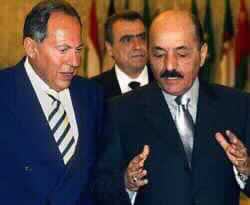HIGHLIGHTS: Blair Faces Stiff Opposition to U.S.-Led Attack||U.S. Jets Attack a Radar Missile Base in Southern Iraq||Iraqi Opposition Has no Roots on the Ground||Two Recent U.S. Polls Show Americans Less Enthusiastic about Potential War against Iraq|| STORY: Iraq said on Friday the United States would not be able to topple President Saddam Hussein the same way it overthrew Afghanistan's Taliban, as Washington demanded Iraq disarm "now" and ruled out any talks.
The United States ignored calls for a new U.N. Security Council resolution to approve any American military action against Iraq while key ally British Prime Minister Tony Blair faced opposition from his own party to a U.S.-led attack.
"The United States' position is that the Iraqi regime needs to abide by its obligations -- there is no room for negotiations or discussion -- they need to do so and do so now," White House spokesman Scott McClellan told reporters with President Bush on his August vacation.
McClellan repeated U.S. insistence that Iraq carry out commitments made after the 1991 Gulf War to disarm.
In a sign of rising tension, U.S. jets attacked an anti-aircraft missile site in a "no-fly" zone over southern Iraq in response to what the U.S. military said were repeated Iraqi attempts to shoot down U.S. and British jets patrolling the zone. It was the eighth raid in less than two weeks.
But Iraqi Vice President Taha Yassin Ramadan said Washington knew it could not overthrow Saddam the same way it ousted the Taliban. "We don't want to compare the two; Iraq is not Afghanistan," Ramadan told reporters in Beirut. "I believe that the U.S. administration is convinced of that."
Iraqi opposition sources said they were planning to meet in September to elect a government backed by the United States.
But Ramadan said: "This talk about the Iraqi opposition is insignificant, something that doesn't merit a reply. It doesn't exist, and has no roots on the ground in Iraq."
The White House has pressed for preemptive action against Baghdad, brushing off a groundswell of unease among European allies, Muslim states and broader world public opinion.
"We owe it to our children, we owe it to our grandchildren to make sure that the world's worst leaders do not develop and deploy the world's worst weapons," Bush said in a fund-raising speech that did not mention Iraq specifically.
Two new polls out on Friday showed Americans less enthusiastic of a potential war with Iraq.
A poll for Time Magazine and CNN found that support for a U.S. ground invasion of Iraq at 51 percent while 40 percent of those surveyed opposed such an action. Last December a similar poll found 70 percent in favor and 22 percent against.
A Newsweek poll showed 62 percent would support military force against Iraq but fewer than half, 49 percent, would support sending large numbers of ground troops into Iraq.
The Newsweek poll also showed a large majority believing it important for the United States to build support among European allies and in the United Nations before taking action. And 51 percent said Washington should win the support of Arab countries friendly to the United States.
The two polls, each of just over 1,000 people, were conducted on Aug. 28 and 29.
Military and security experts say a war with Iraq could still be months away. They said there were few signs of the kind of buildup required for an invasion of Iraq, or even of a consensus on what shape it should take.
U.S. IGNORES CALLS FOR A NEWS U.N. RESOLUTION ON IRAQ
Disagreement with the United States over Iraq weighed heavily on an informal meeting in Denmark of European Union foreign ministers who are expected to reaffirm their support for U.N.-led efforts to persuade Saddam to readmit arms inspectors.
British Foreign Secretary Jack Straw played down differences within the EU over Iraq, saying: "There is widespread agreement across Europe and indeed the world about Iraq and the threat it poses."
"If Saddam Hussein has nothing to hide, then he has nothing to fear from the reintroduction of the arms inspectors. And that is what we want to see," Straw said. "But of course we do not rule out the possibility of military action in appropriate circumstances."
Many EU leaders, including French President Jacques Chirac and German Chancellor Gerhard Schroeder, have opposed military action, at least for the time being, given the lack of a Middle East peace process. Britain's Blair has generally been closer to Washington on the issue.
At the United Nations, talk about a new U.N. Security Council resolution to approve any American military action against Iraq was gaining momentum though discussions around the world were still at an early stage.
Most Security Council diplomats argue that without another resolution, existing measures do not provide a legal basis for a "regime change" -- Bush's euphemism for overthrowing Saddam whom he accuses of developing weapons of mass destruction.
Arms experts left Iraq in December 1998 on the eve of a U.S.-British bombing raid and have not been allowed to return.
PHOTO CAPTION
Iraqi Vice President Taha Yassin Ramadan (R) and Lebanese President Emile Lahoud meet in Beirut August 30, 2002. Ramadan is on a trip to Lebanon and Syria to drum up diplomatic support for Baghdad in the face of U.S. threats to attack and oust Iraqi President Saddam Hussein. (Mohamed Azakir/Reuters)
- Author:
& News Agencies - Section:
WORLD HEADLINES


 Home
Home Discover Islam
Discover Islam Quran Recitations
Quran Recitations Lectures
Lectures
 Fatwa
Fatwa Articles
Articles Fiqh
Fiqh E-Books
E-Books Boys & Girls
Boys & Girls  Articles
Articles










